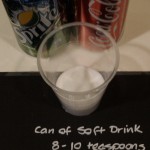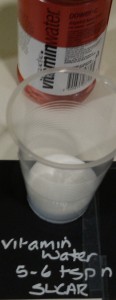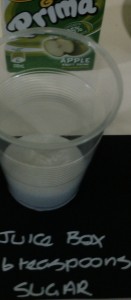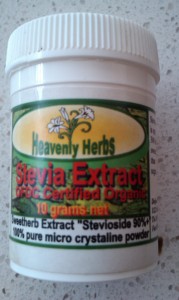Sugar: What You Don’t Know You’re Drinking That’s Making You Sick
The other day when I was at the Chiropractor I noticed a display on the hall table which had soft drink cans, juice boxes, fruit juice bottles, breakfasts in a box all labelled with the amount of sugar in each.
Have you ever looked at how much sugar there is in your drinks?!
Here are just a few examples:
Shocked yet? Making sense now why your kids are jumping around all day after drinking a juice box? and what about the Vitamin water? how about taking an actual vitamin instead, you’ll actually get vitamins out of it, not sugar!
You may be wondering, ‘So what?’ ok, well let me show you some of the side effects of having a lot of sugar in your daily diet:
- Depression
- Diabetes
- Metabolic syndrome
- Weight gain
- Tiredness
- Lack of concentration
- Slow metabolism
These are just a few side effects, I could fill an entire page with the side effects of sugar but I’m sure you get the idea.
And if those reasons weren’t enough for you to cringe, this one is enough, especially for me, to stay away from sugar forever:
- Sugar feeds cancer
Yep, now I’m officially done with sugar!
‘Ok, if this is true what can we have instead of sugar?’
Well, lucky for those of you who enjoy your sugar, there are some great alternatives! Sure, you should give up the sugar, but you don’t have to give up the sweet taste. There are two natural, organic sugar alternatives that are sweet, easy to use and cook with – Stevia and Xylitol. I’ve never had Xylitol so I can’t speak to that, but I can tell you about Stevia.
Stevia is a herb that has been used as a sweetener in South America for hundreds of years.
It is calorie-free, which means it has no effect on our bodies’ production of insulin unlike the normal sugar you would get with your daily coffee or use at home.
In its powdered concentrate, is 300 times sweeter than sugar, so only tiny amounts are needed for sweetening.
It is widely used all over the world. In Japan, for example, it claims 41% of the sweetener market, including sugar, and was used in Japanese Diet Coke until the company replaced it with aspartame (to “standardize” worldwide).
On a side note, aspartame might as well be poison so stay away from it, please. But just to show you, here are some of the side effects, starting from minor reactions to life-threatening conditions:
- Migraines
- Change in vision
- Nausea and vomiting
- Insomnia
- Abdomen and joint problems
- Change in heart rate
- Depression
- Memory loss
- Seizure
- Brain cancer
There have not been any reports of toxicity with stevia, which is consumed by millions of people daily. In Australia stevia is sold as a supplement and it is readily available from various supermarkets/chemists
A wonderful article that puts the whole sugar industry in perspective is published by the Herb Research Foundation: Stevia Leaf – Too Good To Be Legal? by Rob McCaleb (http://www.dorway.com/stevia2.html) .
Andrew Zagami





